Happy every day to those who identify as women. Migrant Women Press is inclusive of women of different backgrounds and identities, and supports all women equally. We have immense admiration for the struggles of women, migrant women in particular: We are here to celebrate them today and every day. Speaking about and shedding light on them remains a sole aspect of our goals, but as we continue to grow with our small team of collaborators, all of whom happen to be women, we are proud of what our gender offers. Here is to breaking strict gender roles and basking into the glory of mothers, daughters, wives, girls: basking in the glory that is women of our communities, of our world. To celebrate International Women’s Day, Migrant Women Press asked some writers to mention their inspirational woman figure.
by Juliana da Penha and Yara Aly (The Virginia House)
“Throughout my life, my mother has shown me what it means to be the epitome of strength.”

As we celebrate International Women’s Day, many of us will use this time to reflect on the women who have inspired us. Typically, this will range from activists to political figures to business leaders. When I think about my source of inspiration, my choice is much closer to home: this is a woman the world does not get to experience often, but when it does, she fills it with love and positivity. She’s my mother. Throughout my life, my mother has shown me what it means to be the epitome of strength. After losing my elder brother to cancer in 2017, my mum has taught me how to be brave, determined and resilient. My mother always emphasises the importance of keeping on trying no matter how tricky life gets. Her uplifting spirit reminds me that there is always light, even in dark times. Her ability to show kindness and compassion extends beyond our home. Besides spending her time taking care of her family, my mother dedicates her time to helping people progress in their lives. Without watching my mum being a good person and honouring her life, much of who I am would be different. I am and always will be grateful for my mother, Frederica.
Angelica Solomon is an International Development graduate from the University of Reading whose passion and commitment is empowering marginalised people in society; it stirs her to explore the intersection of societal issues. She enjoys educating herself and applying her knowledge to create a more equitable society. She is a Fundraising Officer at Migrant Women Press.
“Her responsibility to cover important historical events on the spot is inspiring. More so, she refused to be defined by her husband’s reputation and refused to live in his shadow.”
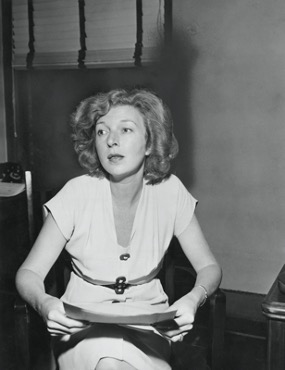
FPG/Archive Photos, via Getty Images
Martha Gellhorn is an American journalist and travel writer. She is not known for her novels as much as she is as a war correspondent, social activist, avid writer and traveller, and as the wife of Hemingway. Her responsibility to cover important historical events on the spot is inspiring. More so, she refused to be defined by her husband’s reputation and refused to live in his shadow.
My inspiration and fascination with her are extremely personal: She is not only genuine but immensely sensual, sensitive, and stubborn as a writer. I am fond of reading her letters and travel notes in particular; she always carries anecdotes in her pocket, heart, and at the tip of her pen. She is feminine and a feminist; perhaps not in feminism’s usual sense: rather, in its incarnation and manifestation. That is what Marty is to me and to many others.
Yara Aly is an Egyptian Editor, Translator, and Filmmaker. She runs her editing house, The Virginia House, with a team of womxn. As an English Literature graduate, she loves slang, paper, ink, books, and woke topics. She is Managing Editor at Migrant Women Press.
“She taught me that you must not be perfect to be good.”

My inspiration is my mother, Marina Bueno Bastos. Not because she is an activist. She isn’t. Or a hardcore feminist (also not). But because she is the woman who taught me that our homes are open to those in need, always. That we stand by others, not only women but especially women in need. That we are capable of forgiveness and must use it.
My earliest memories include her offering our home to anyone who needed it: to women leaving toxic relationships, to mothers, daughters, friends and friends of friends. Always those in need. I don’t claim to romanticise her, because she is not perfect, but that is precisely why I will always choose my mother. She taught me that you need not be perfect to be good. And she could never be contained in 150 words, much like the sea she so loves, she could never be contained.
Isadora Bueno Bastos is a Brazilian student at the University of Glasgow and an aspiring Editor and Translator at Migrant Women Press.
“Her empowerment exposes the need for equality in local communities where women are marginalised.”

The woman I choose is Dr Ama Onyerinma, a Nigerian educator, an advocate, and an entrepreneur. Dr Ama is the founder of a nonprofit organisation called Live Abundantly. This organisation addresses the high prevalence of violence against vulnerable groups: women, children, and the physically challenged. Her organisation works hard to change the theories that keep women behind, through dialogue, education, legislation, and elevation of victims’ voices. Her consistent support to less privileged children is highly inspiring.
Most importantly, Dr Ama empowers women to know their rights and to prepare for the economic sphere. Her education helps women understand their importance in the socio-economic development of their families and communities. Her empowerment exposes the need for equality in local communities where women are marginalised.
Azuh Ify Chylian is a 30-year-old Nigerian advocate and the founder of a women-centred return migrants organisation in Nigeria. She is based in Lagos State. As a return migrant, she is dedicated to supporting traumatized return migrants and working with them to advocate for change in our communities, through education on issues that challenge women and increase their desire to migrate irregularly. She is a collaborator at Migrant Women Press.
“She’s my heroine.”
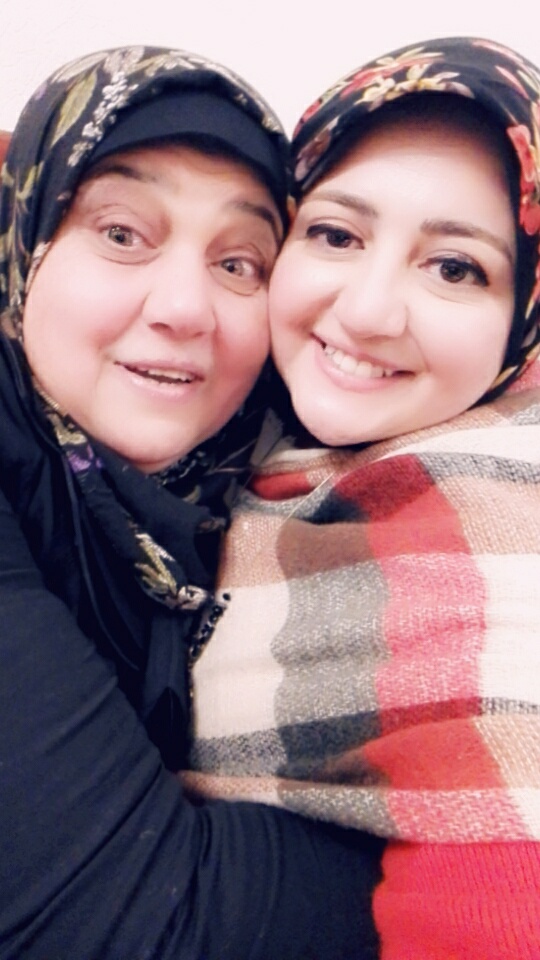
For International Women’s Day, I wanted to reflect on the woman who has inspired me and continues to shape who I am today.
When I think of inspirational women, I do not think immediately about those who have achieved success in a leadership role, but of who has taught me about respect, compassion, honesty and humility—and without knowing it made such an incredible difference in my life: My mum.
Mum is my role model and the whole reason why I am involved with charities. Ever since I can remember, there was one thing she would always repeat: “Always share with and help others”. As a kid, it was hard for me to share my things, but with time I started to understand what she meant. She made me understand the truth about life and the other side of life we don’t see every day. Mum is a godsend, an angel.
Sara Gamal is a proud Egyptian girl; a dreamer; a translator; a writer. Born a storyteller and living the life of making her passions a reality. She is a proficient Creative Writer for several magazines and newspapers in Egypt: SHE HUB, Mamlkty Magazine, Al Masry Al Demokraty Newspaper, and Al-Haram El Masry News. She firmly believes that passionate dreamers create many of the things we enjoy in life. She is writer at Migrant Women Press.
“Her belief, resilience, and care for her family and others inspire me.”
Simone Amorim is from Bahia, Brazil and was the first one from her family to migrate to Europe for a better life over 30 years ago. She then brought her brothers and sisters, and now proudly passes on traditions from back home to the young generation born in the UK. Her belief, resilience, and her care for her family and others, inspire me.
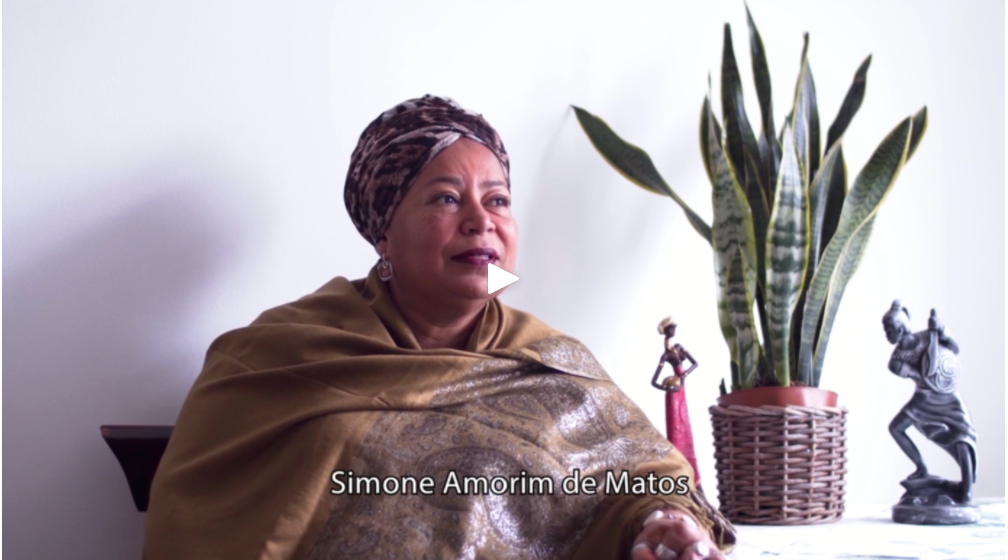
Carolina Cal is a Brazilian theatre practitioner based in London. She is the Founding Artistic Director at MinA (Migrants in Action), a community theatre group for Brazilian women who experience gender-based violence in London.
“Mothers influence our lives beautifully.”

Like many children, my biggest hero is my mum: a mum with a free, open mind, and with an endless, loving soul. We need to cherish our mothers on this special day. The ones who hold our hand and walk side by side with us in the journey of life. Women who rise from their ashes.
Esin Tanrisever is from Istanbul, Turkey. She studies Graphic Design at the Royal Academy of Antwerp, Belgium. She is a life enthusiast and a person who likes to reinvent herself. She is an intern Graphic Designer at Migrant Women Press.
“She is known for advocating social justice, especially with refugees, cultural appropriation, and Arab identity.”
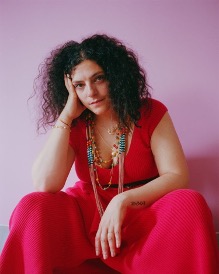
Céline Semaan-Vernon is a Lebanese-Canadian designer, writer, and activist. She is the founder of Slow Factory Foundation, a public-service organization working at the intersection of climate and culture; building anti-racist community; and growing climate-positive global movements. Quoting her LinkedIn profile, she is “a modern ambassador of cultures, fostering communication across industry, policy, and academia. Her research focuses on circular design and communication, translating complex concepts and systems into approachable stories that resonate with a wide audience. She is known for her activism in social justice causes especially around refugees, cultural appropriation, and Arab identity.”
I came across her work just at the right time; freshly out of university, living in a European capital, away from my hometown of Istanbul, Turkey, wondering ‘what’s next?” Depressed over the complex atrocities of this world, quietly asking myself: Will I ever be able to transform this anger inside me into something meaningful? What ways are there to take action? Do I have any agency, any power?
Semaan’s work introduced me to concepts like open education and sustainability. It encouraged me to include colonialism in my critical thinking lens. I acknowledged the importance of having a clear vision of the things I wanted to change in the world and the power of community. To me, Slow Factory is a great example of how it is indeed possible to create, grow together, and take meaningful action. I feel like women (and any person who is part of a gender minority, really) have immense creative and regenerative power. Semaan’s work and online presence feel like just the right balance between hope and reality. Her path gives me the strength to pursue my own.
Şebnem Adıyaman is a researcher, communicator and artist from Istanbul, Turkey. After moving to Paris in 2016 to study Sociology at Sorbonne University, she is currently back in her home town of Istanbul. A curiosity as to the way societies function had sparked her interest in social sciences; currently, though, she is more intrigued by how they evolve and she envisions building a career around mechanisms of social change. Migration, gender, communication, and culture have been her main areas of learning and expertise thus far. She writes poetry, sings, and plays the flute and the piano. Currently, she is working as a researcher on corporate governance, managing and creating content for Migrant Women Press’ social media accounts, and working on a podcast that focuses on music as a personal and political narration tool.
“She is an example of strength and effort and dreams that are worth something, beyond the socially imposed ways and limits.”
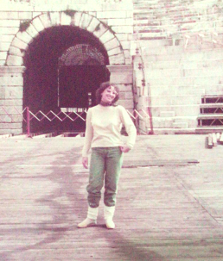
This is Francesca, my mother. She was very young when she had her first daughter, and had three by the time she was 26, when she decided to start university and graduate early and with honours. I remember her underlined books, her sleepless nights repeating the still-fresh pages while we sisters quietly made up games so as not to disturb her.
To me, she is an example of goals that can be achieved late in life and therefore have no less value than any other. She is an example of strength and effort and dreams that are worth something, beyond the socially imposed ways and limits. She has taught me that anything is possible, that being a mother at a young age is nothing more than a stepping stone to strive for a better future, that books open new worlds that rarely betray, that love always saves.
Carlotta Pisano holds a postgraduate degree in Contemporary Anthropology from NOVA University in Lisbon and a bachelor’s in European Literature for Publishing and Cultural Production from the University of Pisa. She writes short stories, reads many books, and has lived in Portugal since 2009, where she works with international mobility projects. She teaches for the Ideas Club course at NOVA for SPU international students. Her interests are mainly related to intercultural communication and integration. She is a writer at Migrant Women Press.
“I owe her the reason why I decided to pursue a career in journalism; how I am not afraid to speak up and write stories that will bring out the truth, even when it is ugly.”

It is hard to choose one woman that is capable of inspiring me, considering that all the women I have met in my life and career have inspired and motivated me in different ways. But there is a journalist that I admired so much growing up, and her name is Oriana Fallaci. I owe her the reason why I decided to pursue a career in journalism; how I am not afraid to speak up and write stories that will bring out the truth, even when it is ugly. Thanks to her inspiration I have discovered the beauty of travelling in the pursuit of a story, discovering new cultures, exploring this world trying to give voice to all the people that are not free to speak.
Ilaria Biancacci is the founder and senior Editor at Wempower, a London-based news platform that focuses on real-life stories of empowered women. The aim of Wempower is to change the narrative on women rights and gender issues, highlighting the extraordinary stories of ordinary women who are building a more resilient, inclusive, and equal society.
“I could look for famous, important people in the press, but my mother is so inspiring.”

The real woman who inspires me is known as “Aunt Dete” and she is my mother. My mother has always been a social activist and worked voluntarily, without receiving a nickel. My mother never had a job with income; my father worked and my mother, who also managed the house, was available to do social work in the periphery of Salvador, Bahia, Brazil.
She helped other mothers with their children’s school enrollment. She helped other mothers when their sons were in trouble and ended up at the police station. In an episode that caught my attention when I was a child, a friend of my parents’ set fire to their house and his family, nine children and his wife, were left on the street. My mother took them all in for a few months; our house had four rooms, a kitchen, and a bathroom. She found spots for the children at a local school, got assistance with repairing the house, and finally helped with the psychiatric admission of the father who set fire to the house.
My mother has many stories of generosity: I could look for famous, important people in the press, but my mother is so inspiring. When she was part of the community council of the Pau da Lima neighbourhood, the “Cidade Mãe Project”, a social project that won a UN prize. The then-first-lady of the USA, Hillary Clinton, handed her the prize. My mother rehearsed her “thank you” for a month. She is my source of inspiration.
Rita de Cássia, I am “Ritinha, the daughter of Tia Dete” as most people know me. I was born almost 52 years ago in Brazil, on the outskirts of the city of Salvador, Bahia, in Pau da Lima, a neighbourhood in which my mother anonymously helped many other mothers. I am a teacher and currently live in Lisbon. I talk to her mother every day on WhatsApp. Almost every day, we laugh, cry, discuss family politics, and proceed with much love and longing. I am also a collaborator at Migrant Women Press.
“Women have sat indoors all these millions of years, so that by this time the very walls are permeated by their creative force, which has, indeed, so overcharged the capacity of bricks and mortar that it must need harness itself to pens and brushes and business and politics.”
― Virginia Woolf, A Room of One’s Own



